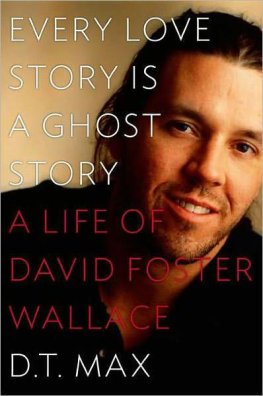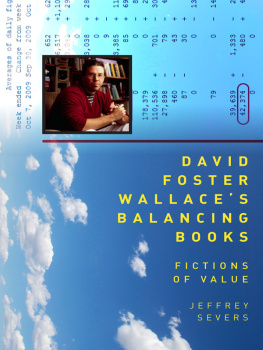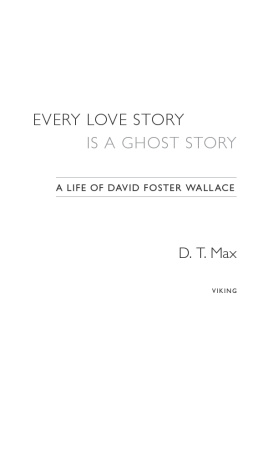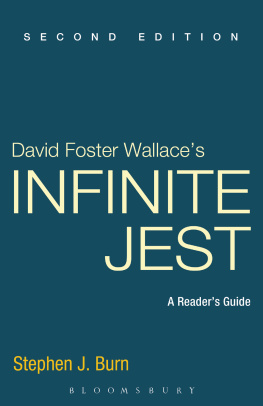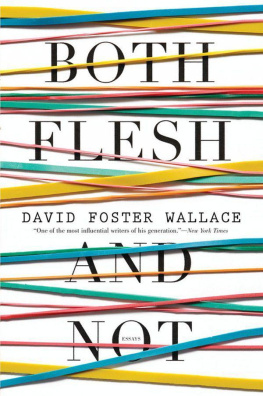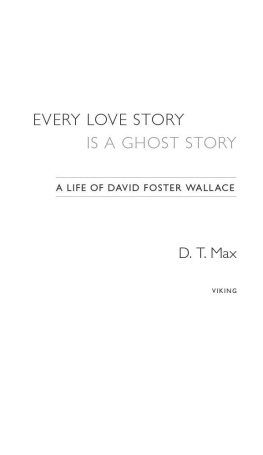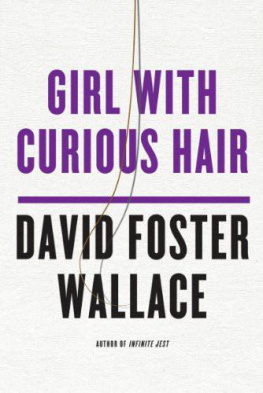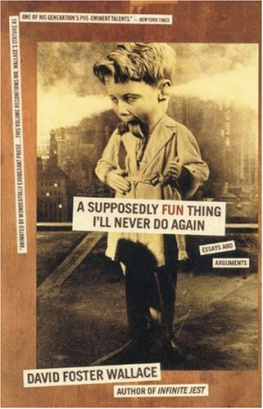Conversations with David Foster Wallace
Literary Conversations Series
Peggy Whitman Prenshaw
General Editor
Conversations with David Foster Wallace
Edited by Stephen J. Burn

Books by David Foster Wallace
The Broom of the System. New York: Viking-Penguin, 1987.
Girl with Curious Hair. New York: Norton, 1989.
With Mark Costello. Signifying Rappers. New York: Ecco, 1990.
Infinite Jest. Boston: Little, 1996.
A Supposedly Fun Thing Ill Never Do Again. Boston: Little, 1997.
Brief Interviews with Hideous Men. Boston: Little, 1999.
Up, Simba! Seven Days on the Trail of an Anticandidate. Boston: Little, 2000.
Everything and More: A Compact History of . New York: Norton, 2003.
Oblivion. Boston: Little, 2004.
Consider the Lobster. Boston: Little, 2005.
McCains Promise: Aboard the Straight Talk Express with John McCain and a Whole Bunch of
Actual Reporters, Thinking about Hope. Fwd. Jacob Weisberg. Boston: Back-Little, 2008.
This Is Water. Boston: Little, 2009.
Fate, Time, and Language: An Essay on Free Will. Ed. Steven M. Cahn and Maureen Eckert.
Introd. James Ryerson New York: Columbia UP 2011.
The Pale King. Ed. Michael Pietsch. Boston: Little, 2011.
www.upress.state.ms.us
The University Press of Mississippi is a member of the Association of American University Presses.
Approaching Infinity, an interview with David Foster Wallace conducted by Caleb Crain, originally published in The Boston Globe, Copyright 2003 by Caleb Crain, used with permission of The Wylie Agency LLC.
Copyright 2012 by University Press of Mississippi
All rights reserved
Manufactured in the United States of America
First printing 2012
Library of Congress Cataloging-in-Publication Data
Conversations with David Foster Wallace / edited by Stephen J. Burn.
p. cm.(Literary conversations series)
Includes index.
ISBN 978-1-61703-226-4 (cloth: alk. paper)ISBN 978-1-61703-227-1 (pbk.: alk. paper)ISBN 978-1-61703-228-8 (ebook) 1. Wallace, David FosterInterviews. 2. Authors, American20th centuryInterviews. I. Burn, Stephen.
PS3573.A425635Z66 2012
813.54dc23
2011027372
British Library Cataloging-in-Publication Data available
Contents
William R. Katovsky / 1987
Helen Dudar / 1987
Hugh Kennedy and Geoffrey Polk / 1993
Larry McCaffery / 1993
Mark Caro / 1996
Laura Miller / 1996
David Streitfeld / 1996
Anne Marie Donahue/1996
Donn Fry / 1997
Matthew Gilbert / 1997
Tom Scocca / 1998
Lorin Stein / 1999
Patrick Arden / 1999
Chris Wright / 1999
Mark Shechner / 2000
John OBrien / 2000
Caleb Crain / 2003
Steve Paulson / 2004
Michael Goldfarb / 2004
Didier Jacob / 2005
Christopher John Farley / 2008
David Lipsky / 2008
Introduction
Im wretched at interviews, David Foster Wallace told me in a letter sent late in the summer of 2007, and will do them only under big duress.turned the mechanics of an interview into a central focus of Wallaces middle-period fiction (Infinite Jest [1996] and Brief Interviews [1999]). This nexus of imaginative activity made the set-piece of an interview something more than a polite formality for Wallace, a pursuit that could not be coolly divorced from creative practice. But there were clearly more personal reasons why Wallace became reticent about interviews. After he became engulfed in the media storm surrounding Infinite Jest, Wallace wrote to Don DeLillo about the experience:
If you try to be unpretentious and candid, a reporter comments on the unpretentious, candid persona youve adopted for the interview. It ends up being lonely and wildly depressing. And strange. I had guys in my house (a tactical error). The guy from the Post whos become a friend because he was my first interview and I was wildly indiscreet about stuff like drug histories and he stopped me in the middle and patiently explained certain rules about what to tell reporters
Yet good advice might only lessen, not eradicate, personal intrusion. When Frank Bruni interviewed Wallace for New York Times Magazine, he felt obliged to chronicle the contents of the novelists medicine cabinet (his bathroom contains special tooth polish to combat the effects of the tobacco
Why, then, gather a collection of interviews with Wallace? On a basic level, its notable that in the years since Wallaces death, Wallace-the-person (as opposed to purely the stylistic or thematic specter of Wallace-the-writer) has become an increasing presence in contemporary American literaturein Jeffrey Eugenidess Extreme Solitude (2010), Richard Powerss Generosity (2009), and most directly in Jonathan Franzens Freedom (2010), Wallaces biography seems to be recast and diffused through each narrative. While his technical influence is certainly still widely in evidenceWallaces nested narration is playfully parodied in Jennifer Egans A Visit from the Goon Squad (2010)because a good interview or profile illuminates both the writer and the work, its easier to objectively ask questions about the parallels between Wallaces biography and such fictionsand hence, to measure Wallaces personal impact on American lettersafter reading these interviews. What does it mean, for instance, to note David Lipskys revelation that Wallace painted his bedroom black and was fascinated by Margaret Thatcher, and then register that such details overlap with Richard Katzs biography in Freedom?
Equally, while Wallace entertained few illusions about the interviews formal limitations, it doesnt necessarily follow that his own interviews were failures. His acute sensitivity to the mediums boundaries made the interview a productive haven for Wallaces remarkable articulacy. As Jonathan Franzen has argued, the structure of interviews provided a formal enclosure in which Wallace could safely draw on his enormous native store of kindness and wisdom and expertise.yearsirony, his relationship to other writersare widely represented in this collection. Equally there are also revealing statements about his attitude to MFA programs (especially in the interview by Hugh Kennedy and Geoffrey Polk), his negotiations with religious belief (particularly in the pieces by Streitfeld, Gilbert, and Arden), the role of footnotes in his writing (again, the Gilbert interview is illuminating), and his multifaceted conception of his novels architecture. Wallace explains to Mark Caro, for example, that Infinite Jest is patterned like a very pretty pane of glass that had been dropped off the twentieth story of a building, and then tells Anne Marie Donahue that the same novel is also really designed more like a piece of music than like a book.
Across the body of the interviews, its also notable that patterns begin to emerge that give some indications of Wallaces shifting preoccupations. While Wallace deflects attention from Brief Interviews with Hideous Men, describing its agenda as technical, formal stuff that I dont know if I want to talk about (Arden), in interviews accompanying Oblivion, by contrast, he repeatedly takes care to contextualize quotations from the stories by drawing attention to the books hybrid narratorial perspectives. Discussing Mister Squishy with Michael Goldfarb, for example, Wallace notes that the narrators perspective shuttles in and out of a more omniscient third-person narrator into the consciousness of Terry Schmidt. Similarly, when reading a section from The Soul Is Not a Smithy, Wallace highlights another variegated lens when he tells Steve Paulson that his narrator is partly narrating as a child and partly as an adult. In addition to such technical matters, its also possible to map out larger, more general, alterations in Wallaces working life that unfold across two decades of talking to interviewers. In early 1987, for instance, when Helen Dudar profiled Wallace for the
Next page

